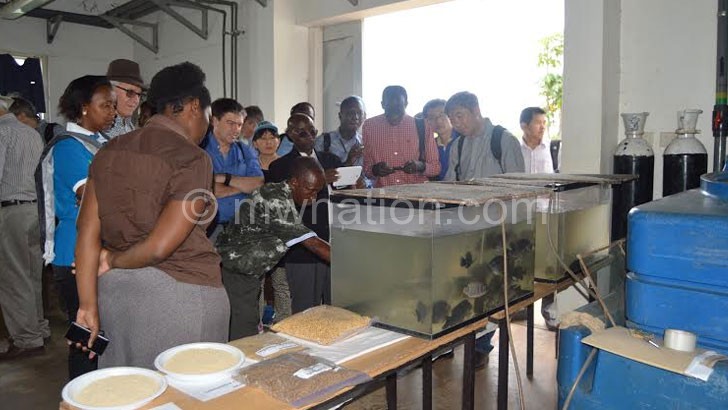Feed Remains a Challenge in the Aquaculture Industry
Despite the fact that over 60 percent of the animal protein intake in Malawi comes from fish and an estimated 6,000 farmers are engaged in fish farming, high cost of feed hampers the growth of aquaculture industry in the country.
This was revealed recently during an Agriculture Technology Transfer (AgriTT) Research Challenge Fund End of Programme Success and Lesson Learning Conference at Bingu International Conference Centre ( BICC) whereby researchers from Malawi and other African countries, UK as well as China shared lessons and experiences for their research projects.

According to Lilongwe University of Agriculture and Natural Resources (LUANAR) Deputy Vice Chancellor Professor Emmanuel Kaunda who is also a Principle Investigator in the project “Development of Low Cost Diets, Optimum Feeding Strategies and Marketing for Enhanced Tilapia Production”, feed has been affecting the productivity of fish and it was for this reason that LUANAR initiated a research on developing low cost diets.
He said the project aimed at developing low cost diets based on known natural foods in the pond and benchmark the diets against proven commercial tilapia feeds, identify appropriate feeding strategies, determine opportunities, constraints to adopt the feed and feeding practices developed as well as assess consumer preferences and their willingness to pay.
“The project has generated useful information for use in subsequent feed research and for making decisions in tilapia marketing,” said Kaunda.
He further said the research revealed that Tilapia would prefer natural feeds when they are smaller and switch to supplemental foods at a later stage and that farmers need to intensify manure application when the fish are small to stimulate natural productivity.
Opening the conference, LUANAR Vice Chancellor, Professor George Kanyama-Phiri hailed UK’s Department for International Development (DiFD) for funding the AgriTT program saying this has proven that the trilateral partnership between Africa, Britain and China is not only possible, but is very important for development of the Agriculture Sector.
He said his institution recognises the role that Aquaculture and fisheries is playing in the country and have committed to establish a Department, under the Faculty of Natural Resources which oversees the Aquaculture and Fisheries sector.
“The Department is involved in capacity building, research and development of technologies in aquaculture and fisheries in Southern Africa. It is also with great pleasure to inform you that currently, the University has been designated as World Bank African Centre of Excellence (ACE) in Aquaculture and Fisheries,” said Kanyama-Phiri.
Kanyama-Phiri further congratulated participating scientists for being successful in the competitive grants as well as for delivering results in the short period of time.
“Please make use of this gathering to learn and share lessons so that this is not the end of the program but a beginning of a new era of partnership among the various projects,” he said.
The conference was hosted by Lilongwe University of Agriculture and Natural Resources (LUANAR) in collaboration with the AgriTT Program Management Office and Forum for Agricultural Research in Africa (FARA).





